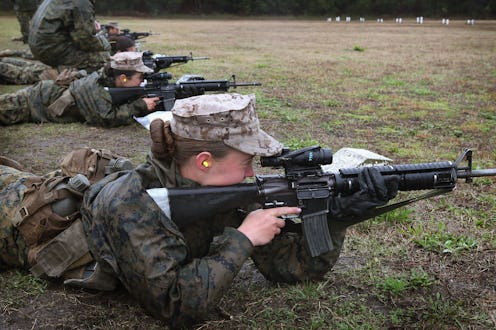Life
How Does The Military Deal With Sexual Assault?
Sexual assault is a problem everywhere, in every country, for women and men of every race, religion, socio-economic status and sexual orientation, but sexual assault survivors face different challenges in different circumstances. For instance, a new report reveals that sexual assault victims in the military who report their assault are 12 times more likely to face retaliation for reporting than they are to see their attackers punished. And even given the especially low expectations I have when it comes to sexual assault cases, that is just terrible.
The report, from the international research and advocacy organization Human Rights Watch, is fairly damning. According to their research, only five percent of reported cases of sexual assault results in a conviction. On the other hand, 62 percent of victims who come forward face retaliation as a result of reporting. Taken together, it seems fairly clear why so few victims report sexual assault in the military — it's estimated that three out of four victims never come forward.
Which, of course, only makes that "five percent of reported cases" number even more appalling. Even the regular criminal justice system, as often as it fails victims, has better statistics than that.
While it's true that the military has been taking sexual assault more seriously in recent years, the report notes that they have a long way to go, not only when it comes to dealing with rapists, but also in preventing retaliation against victims. "Survivors have little recourse if they experience retaliation and few of those who retaliate are held accountable," the report states. "Human Rights Watch was unable to uncover more than two examples of even minor disciplinary action being taken against persons who retaliated against a survivor."
According to survivors Human Rights Watch interviewed, service members who report sexual assault said that they were seen as "troublemakers" as though somehow they were the ones causing problems for the unit, rather than the person who attacked a fellow service member. Survivors reported threats, harassment, and abuse. "At the very moment that they needed support," the reports summarizes, "survivors described peers turning on them due to loyalty to the perpetrator or fear that they would be shunned by association."
The impulse to disbelieve sexual survivors is certainly not confined to the military, nor is backlash against women and men who speak up about their own assaults. However, it is clear that the military needs to do more not only to protect survivors and serve justice to people who attack their fellow service members, but also to change the culture around responses to sexual assault reports.
High-ranking officers in all branches of the military can and should take steps to demonstrate that sexual assault survivors should be respected for their courage in reporting a violent threat in their community and supported as they struggle with the trauma of the assault. And you wouldn't think it would be that hard — after all, the military already frequently deals with people coping with trauma and already values and recognizes courage. It's high time that they get better at doing so for sexual assault survivors.
You can read the full Human Rights Watch report here.
Images: Giphy
